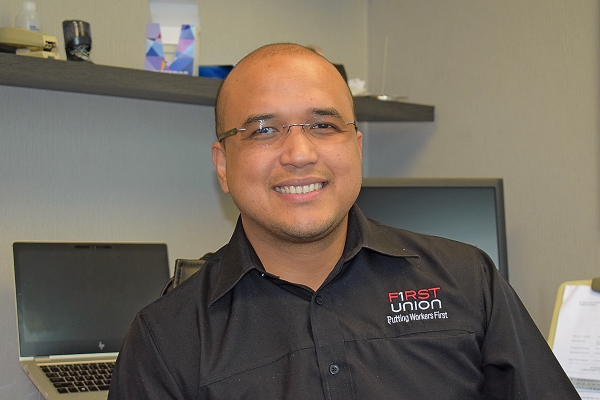First Union’s new general-secretary Dennis Maga credits his Catholic upbringing for his firm belief in socio-economic justice.
“The Catholic Church’s teaching that had the most impact in my upbringing is that we always have to serve the poor,” he told NZ Catholic. “It was in the Roman Catholic Church that I understood the meaning of social justice, which I am grateful for.”
Mr Maga is the first Asian New Zealander to head a major trade union. He was elected to the position in November, 2017.
“[It is a] dream come true. You don’t expect that one day you will be in this position,” he said.
He said he didn’t think a “brown Asian like me” could aspire to the role. “I just want to thank all my colleagues and my predecessor who trusted that I can do the job,” he added.
The mantle of being in charge hasn’t quite settled comfortably on his shoulders yet. “I hate being called a boss. I am still allergic to that term,” he said.
Mr Maga, however, does not lack the experience to run the second biggest trade union in the country.
During his university years, he headed the National Union of Students in the Philippines. After university, he worked for a labour union affiliated to Kilusang Mayo Uno (May First Movement), a major left-leaning trade union in the Philippines. He was mentored by the late Crispin Beltran, who was an iconic KMU leader.
When he moved to New Zealand in 2007, he worked hard at organising migrant workers. He founded Migrante (Filipino migrant workers union) and eventually helped set up the United Network of Migrants (UNEMIG), a network within First Union.
He said his new role is quite a leap from focussing on the problems of migrant workers only to dealing with problems of working people in New Zealand.
“This job is really stressful. If you don’t have the patience and you panic, I don’t think you can run a 27,000 member union,” he said.
“You have to be strategic. You are always thinking ahead especially because the future of work, the employment landscape now in New Zealand and even abroad, keeps on changing,” he said.
He cited the situations in the banking sector where branches are being replaced by call centres and in some retail businesses where self-check-out had been introduced.
“There were some discussions among our members. Would robots take over our jobs? That’s the question about human resources now,” he said.
He said his organisation is also looking at how the union will adapt to future work situations and still be relevant to the workers.
“That is why we have invested in a massive research of different industries [and] how they will adapt to the different technology changes. However, we believe that based on [this] research, the need for human resources will still be the biggest part of any operation of companies,” he said.
As one result of this research, the union found out there are industries which aren’t unionised where exploitation of workers is rampant. A prime example would be horticulture.
“We found out that there are many exploitations and elements of human trafficking in that industry. The Government is very conservative in their approach to address this problem. So the union is stepping up its campaign to address this problem,” he said.
He said another concern for the union is the increasing under-employment, a previously unheard of term in a first world country.
“Thirty hours is now becoming the new full-time hours. But I don’t think anyone who is working in a 30-hour a week job can pay mortgage or even pay for decent rent,” he said.
Mr Maga said there is optimism that labour-oriented policies will be prioritised by new Government.
He said, though, that while the union supported the Labour Party in the last election, the union will still hold the party to account for any unmet promises.
Mr Maga added that the Catholic Church plays one of the biggest roles in society in terms of social justice.
He suggested the setting up of a social justice desk in a parish that would welcome victims of domestic violence or any form of exploitation.
In previous job as a Filipino migrant worker coordinator, he approached some churches to help Filipino workers in distress. The most successful model of helping is that of St Patrick’s, Panmure (Auckland) parish, he said.
“They are really reliable. They house victims of exploitation or domestic violence. They are embrace those victims,” he said. “I’m really proud of that group.”
Once helped, those victims became active members of the Church, he noted.
“For me, that is a good model because the Church is a good and safe refuge for those who are emotionally distressed and separated from their families. They are looking for a new family in their adoptive country and they can find that in the parish community,” he said.

Reader Interactions